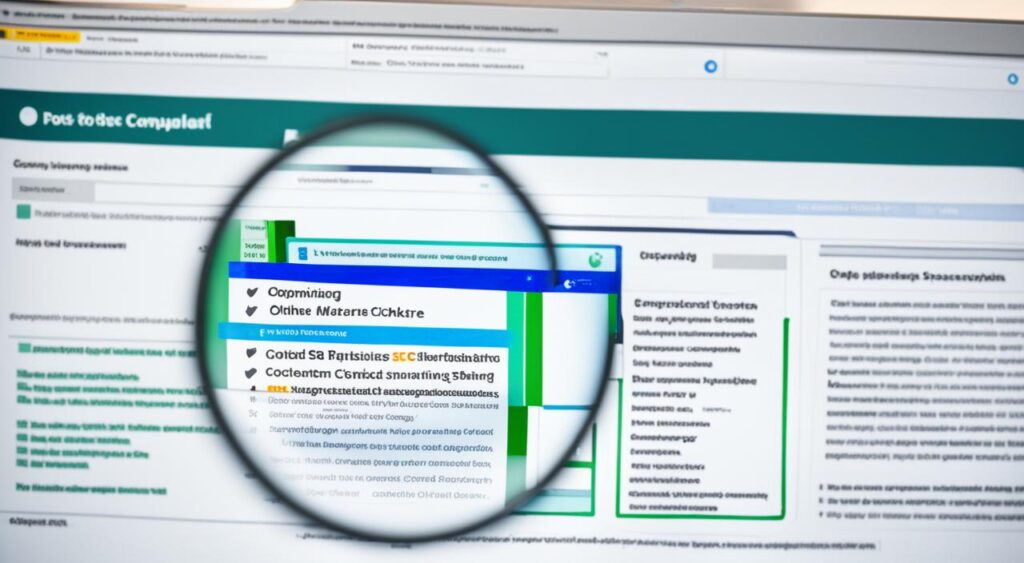Did you know that an overwhelming 93% of online experiences begin with a search engine? In this competitive search landscape, every website owner has an all-important quest: to appear on the coveted first page of Google search rankings. The key to unlocking this door to digital visibility lies in effective content optimization. Enter the post SEO checker—a powerful ally in the battle for online prominence.
As the backbone of website optimization, on-page SEO is a term you’ve likely come across. But it’s not just about embedding keywords; it’s about finessing your content to meet both user intent and search engine algorithms. That’s where the post SEO checker excels. It acts as a meticulous auditor for your website’s content, scrutinizing every heading, keyword, and meta tag. With its guidance, you can significantly upgrade the quality and relevance of your pages, and in turn, enhance your Google search ranking.
Key Takeaways
- An impressive majority of online activities start through search engines, necessitating a high Google search ranking.
- A post SEO checker can dramatically transform your content’s effectiveness and visibility.
- Comprehensive content optimization extends beyond keywords to include a spectrum of on-page SEO elements.
- By enhancing meta tags, keyword density, and content quality, your site can attract a broader readership and rise in online ranks.
- Website optimization is not just beneficial but essential for competing in today’s digital-first world.
- Leveraging a post SEO checker is your strategic move towards optimizing content and securing a prime spot in search engine results.
Understanding the Importance of SEO in Digital Content
In an increasingly digital world, the significance of Search Engine Optimization (SEO) has never been greater for those looking to improve the quality and visibility of their content online. SEO is not merely a checkbox to tick off; it’s an indispensable strategy for anyone aiming to capture and maintain the attention of their audience through organic search visibility.
What is SEO and Why Is It Critical?
Search Engine Journal defines SEO as a multifaceted approach geared towards enhancing both the quality and quantity of web traffic, as well as exposing your brand through organic search engine results. More than just attracting visitors, proper SEO ensures that the traffic to your website is relevant and likely to convert. Forbes further highlights that an effective SEO strategy can offer sustainable value and a competitive edge for your digital content, breaking through the noise in today’s crowded digital space.
Key Factors Affecting Google Search Ranking
While many are familiar with keyword research as the cornerstone of SEO practices, Moz emphasizes that Google’s search ranking algorithm also takes into account factors such as the quality of on-page content, the strength of link signals, and vital website attributes—including mobile-friendliness and swift loading times. Let’s break down why each of these components is critical for your SEO:
- On-page Content: High-quality, relevant articles ensure users find value in your website, prompting longer visits and frequent returns.
- Link Signals: Backlinks from authoritative sites act as a vote of confidence, lending credibility to your content.
- Website Attributes: Performance factors like fast loading speeds and mobile optimization affect user experience, which in turn influences Google’s assessment of your site’s quality.
As you delve into SEO, you’ll soon discover that elements like SEO analysis tools, the optimization of meta tags, and comprehensive keyword research are not just checkboxes for the top ranks; they are your digital beacons guiding the vast internet populace towards the solutions or insights you offer on your website.
The Role of a Post SEO Checker in Website Optimization
When you’re aiming to climb the ranks of search engine results, employing a post SEO checker is a smart tactic for website optimization. This tool is tailored to evaluate and improve your site’s on-page elements, a critical facet of on-page SEO. By offering a comprehensive breakdown of your content’s adherence to SEO best practices, it facilitates improvements that search engines like Google favor.

Let’s delve into the specifics of how a post SEO checker can bolster your on-page SEO efforts:
- Analyzing keyword distribution to ensure that primary and secondary keywords are optimally utilized throughout your content.
- Scanning for meta tags, including titles and descriptions, and verifying their effectiveness in capturing user attention and search engine interest.
- Identifying areas where content can be refined to align more closely with search intent and user engagement metrics.
This SEO diagnostic tool remarkably simplifies the process of identifying and rectifying issues that can hinder your website’s ability to reach its full visibility potential. Take a look at the following table to understand the common issues detected by a post SEO checker and the recommended actions for improvement:
| SEO Elements | Common Issues | Recommended Actions |
|---|---|---|
| Keywords | Underutilization or Keyword Stuffing | Apply keywords judiciously, maintaining a natural flow |
| Meta Tags | Missing or Duplicate Meta Descriptions | Craft unique and descriptive meta tags for each page |
| Content Quality | Poor Readability or Thin Content | Enhance content quality to provide value to users |
Remember that continuous effort in website optimization is key. By routinely using a post SEO checker, you ensure that your on-page SEO strategies adapt to evolving search engine algorithms, keeping you one step ahead in the digital landscape.
Conducting Effective Keyword Research for Your Content
The journey to a successful SEO strategy commences with one critical step: keyword research. By meticulously identifying keywords that resonate with your target audience, you establish a firm groundwork for potent on-page SEO, propelling your content’s visibility and accessibility on search engines. Let’s break down this process, ensuring that you can curate content tailored for both your audience’s needs and the intricate algorithms of search engines.
Identifying Your Target Keywords
Strategic keyword selection is not about guessing what your audience might search for; it’s about knowing it. HubSpot, a leader in inbound marketing, emphasizes that recognizing your target keywords is akin to unlocking the secret language of your potential customers. It’s these phrases and terms that will draw traffic to your website—relevant traffic that not only arrives but stays, engages, and ultimately converts.
Tools and Techniques for Discovering Competitive Keywords
With the correct tools, uncovering competitive keywords that elevate your visibility becomes a streamlined, effective task. Platforms like Google Keyword Planner and SEMRush have emerged as industry standards, revered for their comprehensive data and user-friendly interfaces. Search Engine Watch endorses these tools, encouraging their use to dive deep into keyword analytics and competitive landscape understanding. It’s this insightful analysis that empowers you to refine your content strategy, standing out in the crowded digital space.
- Utilize Google Keyword Planner for initial keyword discovery and search volume insights.
- Leverage SEMRush for in-depth competitive keyword analysis and trends.
- Consider both short-tail and long-tail keywords for a balanced strategy.
- Analyze the intent behind keywords to ensure alignment with user expectations.
Armed with these professional tools and savvy techniques, you’re now well-equipped to conduct keyword research that not just meets the needs of on-page SEO but also aligns seamlessly with the inherent search behaviors of your intended audience.
Improving On-Page SEO with Post SEO Checker
Ensuring your website shines in the eyes of search engines is akin to fine-tuning a machine; every cog, wheel, and gear must align perfectly. The same precision is required in the realm of on-page SEO, where elements like meta tags and content readability play pivotal roles. With key insights from industry experts like Neil Patel and practical tools such as Yoast SEO, you’re equipped to enhance your site’s SEO profile.
Optimizing Meta Tags and Descriptions
Optimizing your meta tags and descriptions is essential for enticing both users and search engines. As Neil Patel asserts, these snippets are your direct pitch to potential visitors on search result pages, influencing both their click-through decisions and the visibility your pages receive. Employ a post seo checker to ensure your meta tags are relevant, succinct, and include strategic keywords. Not only do they impact your click-through rates, but they also serve as a primary checkpoint for search algorithms.
Analyzing and Enhancing Content Readability
Moreover, the simplicity with which your content is digested by readers can influence bounce rates and engagement levels. Yoast SEO emphasizes that content readability is a vital facet of on-page SEO, significantly affecting user engagement. Readability goes beyond the use of language; it embodies the structure, layout, and presentation of your thoughts. Utilizing a post seo checker can help identify areas where readability can be improved, such as sentence length, paragraph size, and the use of headers.
Analyzing your content with a post seo checker also allows for a comparison between current on-page SEO practices and industry benchmarks. Below is a comparative analysis of optimal content readability features.
| Content Feature | Optimal Characteristics | Common Pitfalls |
|---|---|---|
| Paragraph Length | 3-4 Sentences | Excessively long blocks of text |
| Sentence Length | 20 words or fewer | Run-on sentences that confuse readers |
| Subheadings Frequency | Every 300 words | Scarce use causing lack of structure |
| Use of Active Voice | Preferably over 80% | Overuse of passive constructions |
| Transition Words | Approximately 30% of sentences | Disjointed text lacking flow |

Remember that the ultimate goal is to ensure your audience finds value and clarity in the content you present. A harmonious balance between optimized meta tags and palatable content readability can set your web pages aloft, cruising towards the summit of search engine rankings. It’s time to place your bets on a post seo checker—an ally in the ceaseless quest for on-page SEO brilliance.
Strategies for Off-Page SEO and Backlink Analysis
As the digital marketplace grows increasingly competitive, enhancing your website’s authority through off-page SEO is more crucial than ever. A significant component of this is establishing a strong backlink profile. Below, we delve into the importance of backlinks in SEO and illustrate how to conduct an effective backlink analysis using robust SEO tools.
Understanding the Impact of Backlinks on SEO
Backlinks serve as the backbone of off-page SEO. They are essentially votes of confidence from one site to another; a signal to search engines that others vouch for your content. According to Ahrefs, a well-rounded backlink profile correlates with higher rankings. Therefore, earning high-quality backlinks can substantially elevate your site’s stature in search engine results.
How to Perform a Backlink Analysis with SEO Tools
Backlink analysis is a fine art that requires precision and the right tools. Using powerful SEO platforms like Ahrefs or Backlinko, you can gain valuable insights into the backlinks your website possesses. Here’s a structured approach to analyzing your backlinks with the goal of bolstering your off-page SEO.
| SEO Tools for Backlink Analysis | Features | Benefits |
|---|---|---|
| Ahrefs | Backlink Checker, Site Explorer | Unveils the domain’s link profile and ranks the quality of backlinks |
| Moz Pro | Link Explorer, Spam Score | Assesses link quality and identifies potentially harmful links |
| Semrush | Backlink Audit Tool | Inspects the link’s types and offers cleansing suggestions for toxic links |
| Majestic | Site Explorer, Trust Flow | Maps out link infrastructure and provides a Trust Flow score for link trustworthiness |
Performing a backlink analysis helps you ensure a healthy link profile, which is fundamental to your off-page SEO strategy. The SEO tools listed above not only help track your backlinks but also provide actionable insights on how to improve your backlink strategy. Armed with these insights, you can then proceed to develop strategic relationships and content that attract backlinks naturally, bolstering your off-page SEO and, ultimately, your search engine rankings.
Conclusion
In summing up our exploration of Search Engine Optimization tools, we have established that the integration of a post SEO checker into your content strategy marks a significant advancement in mastering your digital presence. Your journey through the fundamentals of SEO—from content optimization to the nuance of keyword research—has armed you with the knowledge to magnify your website’s ability to rank favorably in Google search rankings.
This potent SEO analysis tool serves more than one purpose; it is your compass in the multifaceted terrain of online content creation. By providing an in-depth review of your website’s performance, it identifies areas that require enhancements and sheds light on how to amplify your site’s relevance and appeal to both search algorithms and visitors alike. By assiduously applying the insights provided by this tool, you align your website to the benchmarks of both user experience and search engine standards, bridging the gap between accessibility and discoverability.
Your digital marketing goals are now within reach, given that your website’s strengths and opportunities for growth have been illuminated. Embrace the power of an expertly calibrated post SEO checker, and let it guide your steps toward sustained online success and a formidable online reputation. Remember, in the realm of SEO, continual monitoring, and adapting is not just recommended; it is imperative for the growth and longevity of your digital footprint in the competitive marketplace.
FAQ
What is a post SEO checker and how does it enhance website optimization?
A post SEO checker is a tool that analyzes various on-page SEO elements such as headings, keyword density, meta tags, and content quality. By evaluating these components, the tool offers insights and recommendations for improving your website’s optimization, which can lead to enhanced Google search rankings and increased online visibility.
Why is SEO critical for digital content?
SEO, which stands for Search Engine Optimization, is critical because it increases both the quantity and quality of traffic to your website through organic search results. Good SEO practices improve the visibility of digital content, providing sustainable long-term value and giving your website a competitive edge on search engines.
What are the key factors that affect Google search ranking?
Several key factors affect Google search ranking, including on-page content quality, keyword relevance, user experience (such as mobile-friendliness and loading speed), and off-page elements like backlinks. Ensuring these factors are optimized is essential for achieving higher search rankings.
How does a post SEO checker contribute to on-page SEO?
A post SEO checker contributes to on-page SEO by providing a comprehensive analysis of your site’s content and pinpointing areas that need improvement. It can identify issues with keyword usage, meta tags, and other on-page elements, guiding you to make adjustments that optimize your content for better search engine performance.
Why is keyword research fundamental in SEO?
Keyword research is fundamental because it helps you understand what your target audience is searching for. Identifying and integrating the right target keywords into your content ensures that it aligns with user intent and improves your content’s relevance and visibility in search engine results.
What are the benefits of optimizing meta tags and descriptions?
Optimizing meta tags and descriptions is crucial because they provide search engines with information about the content of your web pages. Well-crafted meta tags and descriptions can improve click-through rates and visibility in search engine results, contributing to better on-page SEO.
How does content readability affect SEO?
Content readability affects SEO by impacting user engagement. Content that is easy to understand and navigate can keep users on your site longer, which search engines interpret as a sign of quality and relevance. High readability can, therefore, boost your site’s SEO performance.
What is the impact of backlinks on SEO?
Backlinks significantly impact SEO as they function like endorsements from other sites. A strong backlink profile indicates to search engines that your content is authoritative and valuable, which can lead to higher rankings in search results. Ensuring that you have high-quality backlinks is a key aspect of off-page SEO.
How do you perform a backlink analysis with SEO tools?
Performing a backlink analysis with SEO tools involves using platforms like Ahrefs or Backlinko to evaluate the quantity and quality of backlinks pointing to your website. These tools help you understand your link equity, uncover the value of your backlinks, and identify opportunities for improving your off-page SEO strategy.










